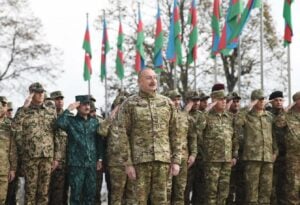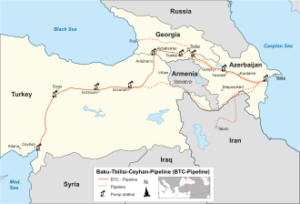
Tensions between Armenia and Azerbaijan had been notoriously high for several years and culminated with an Azerbaijani offensive against Nagorno-Karabakh in 2020. The war lasted about a month and ended with several thousand deaths. Azerbaijan demonstrated its military superiority by capturing most of the land it lost in the First Nagorno-Karabakh War in 1994. The war was ended by a Russian-brokered ceasefire which allowed for the free transfer of Armenians to Nagorno-Karabakh and Azerbaijanis to Nakhchivan. The war was marked by several war crimes on both sides. Following the war, there have been numerous more border skirmishes, with the most potent one being in September of 2022, leaving hundreds total dead.
Currently, Nagorno-Karabakh is desperate; Azerbaijan has blockaded the only land corridor connecting Armenia to Nagorno-Karabakh, preventing essential supplies such as food and water. The ceasefire in 2020 provided for Russian peacekeepers to monitor this corridor -called the Lachin Corridor- but as we all know, Russia has other military duties their troops must attend to. Azerbaijan has violated the terms of the 2020 ceasefire by preventing the exchange of people and goods to Nagorno-Karabakh.
Armenia is part of a mutual defense treaty called the C.S.T.O. (Collective Security Treaty Organization), a mutual defense treaty with members Russia, Belarus, Kazakhstan, Kyrgyzstan, and Tajikistan. The C.S.T.O. is the Russian version of NATO, and according to this organization, an attack against one is treated as an attack against all. The alliance entails that Russia must defend Armenia whenever Azerbaijan attacks Armenia. However, Russia has refused this request which highlights the failure of the C.S.T.O. This shows the true importance of this conflict; it highlights the changing dynamics of alliances in the Caucasus.
Armenia has had strong relations with Russia and the eastern bloc, even after the dissolution of the Soviet Union. On the other hand, since the dissolution of the Soviet Union and the ability of Azerbaijan to control its exports, there has been a massive switch in alliances. With Azerbaijan’s mass exportation of oil, they have become increasingly tied to the Western world by trade. Therefore, Azerbaijan is a powerful country supplied by other powerful countries such as Turkey. On the other hand, Armenia is a weak country supported by Russia. However, Russia is an ally of Armenia in name only. So Armenia has no nations to turn to under Azerbaijani aggression. Russia won’t help; the U.N. may condemn it, but will the U.N. send troops to keep the Lachin Corridor open? Probably not. The West would never help Armenia because Azerbaijan is a major trade partner. So Armenia has no options when it comes to allies.
The reason why many Western countries won’t side with Armenia becomes even more apparent when looking at a map of Oil Pipelines in the Caucasus.

The solid red line depicts the BTC (Baku-T’bilisi-Ceyhan) pipeline, which transports oil from Baku to Turkey, which it can then export to the rest of the world. However, the route is slow because it has to go through Georgia; it could be more direct by cutting out Georgia and connecting Azerbaijan to Turkey via the Azerbaijani exclave of Nakhchivan. If Azerbaijan connected its mainland to Nakhchivan, it would have a direct route to Turkey and be able to increase its oil exports dramatically. This route would also connect Turkey to the rest of the Turkic world, which includes central Asian countries bordering the Caspian Sea.
The future of the Caucasus seems straightforward at this point. Azerbaijan wants control over the Caucasus and a direct pipeline to Turkey. Azerbaijan has been conducting many small military aggressions over a long period rather than at once to avoid international condemnation. Azerbaijan will continue to do this until they achieve what they want, and due to the lack of support for Armenia, Azerbaijan will continue. If recent trends continue, Azerbaijan will get a pipeline to Turkey, the Turkic world will be connected, and Nagorno-Karabakh will be wholly blockaded.
What Armenia can do to stop this seems to be too little too late. Armenia does not have the capacity to return to its territorial extent before the Second Nagorno-Karabakh War. However, control of the Lachin Corridor and Nagorno-Karabakh is more plausible. Realistically Armenia could expand its conscription beyond two years without extreme public outcry due to the extreme levels of nationalism and desire of the public to ensure Nagorno-Karabakh territorial sovereignty. All Armenia needs to do is guarantee the security of free passage of the Lachin corridor, which could be done by force. In a time when skirmishes between the two countries are constant, an operation by Armenia to guarantee international law is followed would not be that outrageous.
Depending on the length of the Russia-Ukraine war, Armenia may also be able to obtain Russian support in guaranteeing free passage of the Lachin Corridor. Armenia can also offer Russia significant oversight over its economy and politics in exchange for Russian intervention on the side of Armenia. Russia has two military bases in Armenia, which allows for the quick deployment of troops. Armenia has to choose just how much they are willing to sacrifice to achieve control over Nagorno-Karabakh.
Negotiation may also be a possibility between Armenia and Azerbaijan. Armenia could offer Azerbaijan a contract to build a pipeline through Armenian Territory going to Nakchivan in exchange for the Lachin Corridor and de-facto sovereignty over Nagorno-Karabakh. Azerbaijan may be inclined to take this offer as a wholescale invasion of Armenian territory to connect mainland Azerbaijan to Nakchivan would cause too much international condemnation. Although most Western countries would support the lower oil prices caused by the shorter pipeline, an invasion of a sovereign nation is likely to invoke sanctions from many countries.
Ultimately only time will tell how the Armenia-Azerbaijan conflict will be resolved, but it is undoubtedly in the interests of all that a peaceful diplomatic solution is arrived at.
—
Aiden Wassermann is a foreign policy commentator and intern for the Studies Department. The views expressed here are his, and not necessarily those of the Foreign Policy Association.